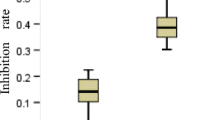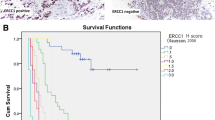Abstract
Systemic therapy improves the survival and quality of life of patients with advanced stage non-small cell lung cancer (NSCLC). Several new therapeutic options have emerged for advanced NSCLC, incorporating novel cytotoxicity agents (taxanes, gemcitabine, pemetrexed) and molecular-targeted agents (erlotinib, bevacizumab) and the optimal prognostic marker for survival remains unclear. The aim of the present study was to assess the prognostic value of the clinicopathologic features and excision repair cross-complementation group-1 (ERCC1) in locally advanced NSCLC patients that received cisplatin-based chemotherapy. Clinical data concerning 80 patients with histopathologically confirmed non-small cell lung cancer who are planned to receive cisplatin-based adjuvant chemotherapy were collected. The protein expression levels for ERCC1 are immunohistochemical examined in 80 patients. The relationship between the ERCC1 protein expression level and the clinical outcomes of the patients is then observed. The 3-year survival rate and median survival time of stage III NSCLC received chemotherapy with/without concurrent chemoradiotherapy were 20 % and 10 months, respectively. Survival of patients with ERCC1-negative tumors was significantly longer than those with ERCC1-positive tumors (p = 0.0001). Prognostic factors with overall survival were performance status, cigarette smoking, stage, weight loss and ERCC1. While as regard progression-free survival prognostic factors were stage, weight loss, ERCC1 and degree of positivity of ERCC1 progression. It was found that ERCC1 protein expression might play an important role in the prognosis of locally advanced NSCLC patients treated with cisplatin-based adjuvant chemotherapy.




Similar content being viewed by others
References
Jemal A, Siegel R, Ward E, et al. Cancer statistics, 2009. CA Cancer J Clin. 2009;59:225–49.
Smit EF, van Meerbeeck JP, Lianes P, et al. Three-arm randomized study of two cisplatin-based regimens and paclitaxel plus gemcitabine in advanced non-small-cell lung cancer: a phase III trial of the European organization for research and treatment of cancer lung cancer group–EORTC 08975. J Clin Oncol. 2003;21:3909–17.
Yau T, Ashley S, Popat S, et al. Time and chemotherapy treatment trends in the treatment of elderly patients (age >/=70 years) with small cell lung cancer. Br J Cancer. 2006;94:18–21.
Ardizzoni A, Boni L, Tiseo M, et al. Cisplatin- versus carboplatin-based chemotherapy in first-line treatment of advanced non-small-cell lung cancer: an individual patient data meta-analysis. J Natl Cancer Inst. 2007;99:847–57.
Friedberg EC. DNA damage and repair. Nature. 2003;421:436–40.
Helleday T, Petermann E, Lundin C, Hodgson B, Sharma RA. DNA repair pathways as targets for cancer therapy. Nat Rev Cancer. 2008;8:193–204.
Phillips DH. Smoking-related DNA and protein adducts in human tissues. Carcinogenesis. 2002;23:1979–2004.
Lababede O, Meziane M, Rice T. Seventh edition of the cancer staging manual and stage grouping of lung cancer: quick reference chart and diagrams. Chest. 2011;139(1):183–9.
Eisenhauer EA, Therasse P, Bogaerts J, et al. New response evaluation criteria in solid tumours: revised RECIST guideline (version 1.1). Eur J Cancer. 2009;45:228–47.
Therasse P, Arbuck SG, Eisenhauer EA, et al. New guidelines to evaluate the response to treatment in solid tumors. European organization for research and treatment of cancer, national cancer institute of the United States, national cancer institute of Canada. J Natl Cancer Inst. 2000;92:205–16.
Seyhan EC, Altın S, Cetinkaya E, et al. Prognostic significance of ERCC1 expression in resected non-small cell lung carcinoma. Ann Thorac Cardiovasc Surg. 2011;17:110–7.
American cancer society: Cancer facts and figures 2014. Atlanta, Ga: American Cancer Society, 2014.
Yau T, Ashley S, Popat S, et al. Time and chemotherapy treatment trends in the treatment of elderly patients (age >/= 70 years) with small cell lung cancer. Br J Cancer. 2009;94:18–21.
Jiang J, Liang X, Zhou X, et al. ERCC1 expression as a prognostic and predictive factor in patients with non-small cell lung cancer: a meta-analysis. Mol Biol Rep. 2012;39(6):6933–42.
Li J, Li ZN, Yu LC, et al. Association of expression of MRP1, BCRP, LRP and ERCC1 with outcome of patients with locally advanced non-small cell lung cancer who received neoadjuvant chemotherapy. Lung Cancer. 2010;69(1):116–22.
Fujii T, Toyooka S, Ichimura K, et al. ERCC1 protein expression predicts the response of cisplatin-based neoadjuvant chemotherapy in non-small-cell lung cancer. Lung Cancer. 2008;59:377–84.
Wang J, Zhang Q, Zhang H, et al. Association between polymorphisms of ERCC1 and response in patients with advanced non-small cell lung cancer receiving cisplatin-based chemotherapy. Zhongguo Fei Ai Za Zhi. 2010;13(4):337–41.
Simon GR, Schell MJ, Begum M. Early indication of survival benefit from ERCC1 and RRM1 tailored chemotherapy in patients with advanced Non-Small Cell Lung Cancer (NSCLC). Evidence from an individual patient analysis. Cancer. 2012;118(9):2525–31.
Olaussen KA, Dunant A, Fouret P, IALT Bio Investigators, et al. DNA repair by ERCC1 in non-small-cell lung cancer and cisplatin-based adjuvant chemotherapy. N Engl J Med. 2006;355:983–91.
Leng XF, Chen MW, Xian L, et al. Combined analysis of mRNA expression of ERCC1, BAG-1, BRCA1, RRM1 and TUBB3 to predict prognosis in patients with non-small cell lung cancer who received adjuvant chemotherapy. J Exp Clin Cancer Res. 2012;31(1):25.
Vokes EE, Herndon JE 2nd, Crawford J, et al. Randomized phase II study of cisplatin with gemcitabine or paclitaxel or vinorelbine as induction chemotherapy followed by concomitant chemoradiotherapy for stage IIIB non-small-cell lung cancer: cancer and leukemia group B study 9431. J Clin Oncol. 2002;20:4191–8.
Belani CP, Lee JS, Socinski MA, et al. Randomized phase III trial comparing cisplatin-etoposide to carboplatin-paclitaxel in advanced or metastatic non-small cell lung cancer. Ann Oncol. 2005;16:1069–75.
Huber RM, Flentje M, Bronchial Carcinoma Therapy Group, et al. Simultaneous chemoradiotherapy compared with radiotherapy alone after induction chemotherapy in inoperable stage IIIA or IIIB non-small-cell lung cancer: study CTRT99/97 by the bronchial carcinoma therapy group. J Clin Oncol. 2006;24(27):4397–404.
Asmis TR, Ding K, Seymour L, et al. Age and comorbidity as independent prognostic factors in the treatment of non small-cell lung cancer: a review of National Cancer institute of Canada clinical trials group trials. J Clin Oncol. 2008;26(1):54–9.
Cappuzzo F, Hirsch FR, Rossi E, et al. Epidermal growth factor receptor gene and protein and gefitinib sensitivity in non-small-cell lung cancer. J Natl Cancer Inst. 2005;97(9):643–55.
Rozensztajn N, Ruppert AM, Lavole A, et al. Factors associated with early progression of non-small-cell lung cancer treated by epidermal growth factor receptor tyrosine-kinase inhibitors. Cancer Med. 2014;3(1):61–9.
Friboulet L, Friboulet KA, Pignon JP, et al. ERCC1 isoform expression and DNA repair in non–small-cell lung cancer. N Engl J Med. 2013;368:1101–10.
Conflict of interest
None.
Author information
Authors and Affiliations
Corresponding author
Rights and permissions
About this article
Cite this article
Sad, L.M., Younis, S.G. & Elity, M.M. Prognostic and predictive role of ERCC1 protein expression in locally advanced stage III non-small cell lung cancer. Med Oncol 31, 58 (2014). https://doi.org/10.1007/s12032-014-0058-9
Received:
Accepted:
Published:
DOI: https://doi.org/10.1007/s12032-014-0058-9




